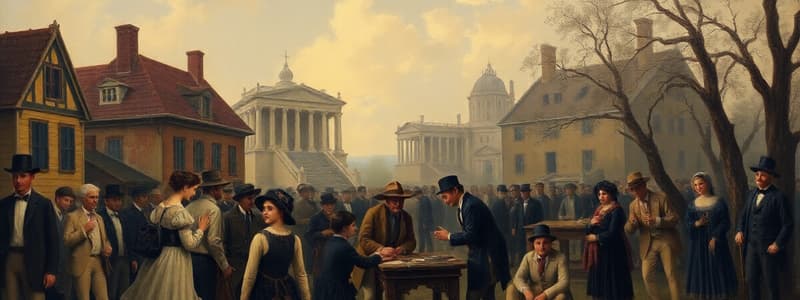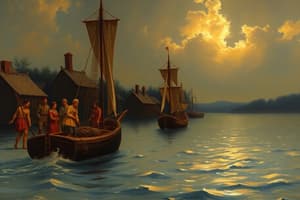Podcast
Questions and Answers
Which concept emphasizes the belief that economic power determines national strength and that a nation's wealth is measured by its stock of gold and silver?
Which concept emphasizes the belief that economic power determines national strength and that a nation's wealth is measured by its stock of gold and silver?
- Enlightenment
- Mercantilism (correct)
- Federalism
- Monroe Doctrine
What was a significant outcome of the Supreme Court case Marbury v. Madison?
What was a significant outcome of the Supreme Court case Marbury v. Madison?
- Federalism in government
- Establishment of judicial review (correct)
- The abolition of slavery
- Horizontal integration
Which amendment to the U.S. Constitution granted women the right to vote?
Which amendment to the U.S. Constitution granted women the right to vote?
- 13th Amendment
- 19th Amendment (correct)
- 15th Amendment
- 14th Amendment
What movement sought to end slavery in the United States?
What movement sought to end slavery in the United States?
What was the primary effect of the Dawes Act of 1887?
What was the primary effect of the Dawes Act of 1887?
What invention is Samuel Morse best known for?
What invention is Samuel Morse best known for?
Which economic strategy involves the concentration of power and resources within a single company?
Which economic strategy involves the concentration of power and resources within a single company?
Which event was a significant catalyst for the American Progressive Movement?
Which event was a significant catalyst for the American Progressive Movement?
What were the main reasons for European exploration in the 15th and 16th centuries?
What were the main reasons for European exploration in the 15th and 16th centuries?
Which of the following events marked the beginning of the American Revolutionary War?
Which of the following events marked the beginning of the American Revolutionary War?
What was the main reason for the establishment of the Jamestown colony in 1607?
What was the main reason for the establishment of the Jamestown colony in 1607?
Which event marked the beginning of the American Revolutionary War?
Which event marked the beginning of the American Revolutionary War?
Which of the following events marked the beginning of the American Revolution?
Which of the following events marked the beginning of the American Revolution?
Flashcards
Mercantilism
Mercantilism
A 17th-century economic theory that emphasized national wealth through trade and government control. It prioritized exports over imports and aimed to accumulate gold and silver reserves.
Enlightenment
Enlightenment
An 18th-century intellectual movement that emphasized reason, individualism, and progress. It challenged traditional authority and advocated for individual rights and freedoms.
John Locke
John Locke
An English philosopher who believed in natural rights (life, liberty, and property), social contract theory, and limited government. His ideas significantly influenced the Declaration of Independence.
Common Sense
Common Sense
Signup and view all the flashcards
Declaration of Independence
Declaration of Independence
Signup and view all the flashcards
Federalism
Federalism
Signup and view all the flashcards
Checks and Balances
Checks and Balances
Signup and view all the flashcards
Bill of Rights
Bill of Rights
Signup and view all the flashcards
Study Notes
2023-2024 Semester 1 Study Guide
- Early American History: Mercantilism, Enlightenment, John Locke, Common Sense, Declaration of Independence, Federalism, Checks and Balances, Bill of Rights, Marbury v. Madison, Judicial Review, Louisiana Purchase, Monroe Doctrine, Manifest Destiny, Market Revolution, Morse Code, Steamboat.
- Social and Economic Reforms: Abolition, Strike (workplace), Economy of the North, Economy of the South, Cotton Gin and Slavery, Seneca Falls Convention, 13th, 14th, 15th Amendments, Ku Klux Klan, Assimilation, Dawes Act, Wounded Knee, Long Horn Cattle & Long Drive, Barbed Wire, Homestead Act, Steel Plow, Industrialization, Bessemer Process, Thomas Edison, Transcontinental Railroad, Andrew Carnegie, Vertical and Horizontal Integration, Social Darwinism, John D. Rockefeller, Monopoly, Sherman Anti-Trust Act, Samuel Gompers, American Federation of Labor, Triangle Shirtwaist Fire, Old Immigration, Ellis Island/Angel Island, Nativism, Chinese Exclusion Act, Gentlemen's Agreement, Urbanization, Americanization.
- Political and Social Issues: Social Gospel, Settlement House, Political Machine, Boss Tweed, Pendleton Act, Architecture in the turn of the century, The Wright Brothers, George Eastman, Booker T. Washington, Tuskegee Institute, W.E.B. DuBois, Jim Crow Laws, Plessy v. Ferguson, Poll Tax, Grandfather Clause, Segregation, William Randolph Hearst, Joseph Pulitzer, Mark Twain, Progressive Movement, Prohibition, Muckraker, Scientific Management, Upton Sinclair, The Jungle, Teddy Roosevelt, Meat Inspection Act, Pure Food and Drug Act.
- Late 19th and Early 20th Century US History: Conservation, NAACP, Taft and Progressivism, Woodrow Wilson and Progressivism, Federal Trade Commission, Federal Reserve System, 19th Amendment, Imperialism, Hawaii, Queen Liliuokalani, Sanford Dole, Alfred T. Mayan, Alaska, Seward's Folly, Yellow Journalism, Jose Marti, Valeriano Wyler, U.S.S. Maine, Commander Dewey, Rough Riders, Spanish American War, Victory Territories, Protectorate, Emilio Aguinaldo, Open Door Policy, Boxer Rebellion, Panama Canal, Roosevelt Corollary, Dollar Diplomacy, Emiliano Zapata, General Pershing, Nationalism, Militarism, Allies, Central Powers, Frank Ferdinand, No Man's Land, Trench Warfare, Lusitania, Zimmerman Telegram, Selective Service Act, Convoy System, American Expeditionary Force, WWI New Technology, War Industries Board, Propaganda, Espionage & Sedition Act, Great Migration, Schenck v. United States, Wilson's 14 Points, League of Nations, Treaty of Versailles, Reparations, Isolationism, Communism, Capitalism, Socialism, Anarchist, Sacco & Vanzetti, Quota Act, Teapot Dome Scandal, Urban Sprawl, Commercial Travel, Modern Conveniences, Advertising Industry, Credit/Installment Plan, 18th Amendment, Speakeasy, Bootlegger, Fundamentalism, Scopes Trial, Flappers, The Mob, Charles Lindbergh.
- Historical Figures and Movements: Zora Neale Hurston, Langston Hughes, Louis Armstrong, Bessie Smith, Harlem Renaissance, Spectator Sports.
Studying That Suits You
Use AI to generate personalized quizzes and flashcards to suit your learning preferences.




